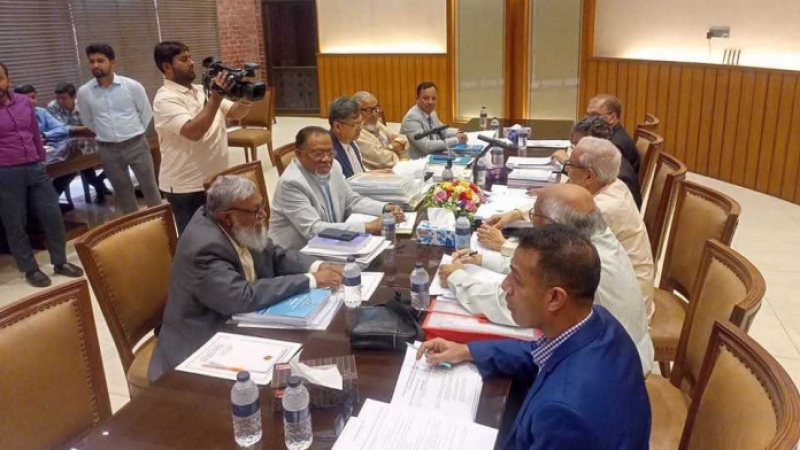- Puppet show enchants Children as Boi Mela comes alive on day 2 |
- DSCC Admin Salam’s drive to make South Dhaka a ‘clean city’ |
- 274 Taliban Dead, 55 Pakistan Troops Killed |
- Now 'open war' with Afghanistan after latest strikes |
- Dhaka's air quality fourth worst in world on Friday morning |
BD’s political parties reach consensus on two key issues

Bangladesh’s political parties on Sunday reached a consensus on two more important reform proposals -- the promulgation of emergency and the appointment of Chief Justice.
The agreement came on the 12th day of the second-round reform dialogue of the National Consensus Commission with the political parties at the Foreign Service Academy in Dhaka.
“The political parties today in principle agreed on two important issues…we, the National Consensus Commission, think of these as a big progress (in building consensus on state reform),” said Commission’s Vice Chair Prof Ali Riaz at a press briefing in the afternoon.
Though another issue–caretaker government-- was discussed on Sunday, it needs further discussion for its formation. The issue will again be discussed on Tuesday, he said.
Promulgation of Emergency
A consensus was attained over a proposal to change the emergency promulgation provision of the Constitution in a bid to prevent its misuse as political tools.
The existing Article 141(A) of the Constitution currently states that If the President is satisfied that a grave emergency exists in which the security or economic life of Bangladesh, or any part thereof, is threatened by war or external aggression or internal disturbance, he may issue a Proclamation of Emergency (for one hundred twenty days). But provided that such Proclamation shall require for its validity the prior counter signature of the Prime Minister.
According to the new proposal, the Proclamation of Emergency can be issued for 90 days and ‘internal disturbance’ will be replaced by the threats towards independence, sovereignty and integration of the State.
But such Proclamation shall require for its validity the prior approval of the Cabinet.
The leader of the opposition or in his/her absence, the deputy leader of the opposition shall be invited to the Cabinet meeting to be held to endorse the decision to declare the emergency, said the proposal.
The state of emergency can be extended for 30 days after the first 90 days.
During the emergency, two rights of any citizen shall not be undermined. These are – right to life: and right to protection from persecution, cruel, inhumane or defamatory behaviour or punishment.
Appointment of Chief Justice
The political parties agreed on a proposal that the most senior justice of the Appellate Division shall be appointed as the Chief Justice. But if any political party promises in its next electoral manifesto that the chief justice shall be appointed from the most two senior justices, the provision can be incorporated in the Article 95 (1) of the Constitution.
The existing Article 95 (1) states that ‘the Chief Justice shall be appointed by the President, and the other Judges shall be appointed by the President after consultation with the Chief Justice.’
Earlier several political parties including Jamaat and NCP proposed that the most senior justice of the Appellate Division shall be appointed as the Chief Justice, while BNP placed a proposal that Chief Justice should be appointed from the two senior most justices of the Appellate Division.
BNP Standing Committee member Salahuddin Ahmed, Bangladesh Jamaat-e-Islami Nayeb-e-Ameer Syed Abdullah Muhammad Taher and leaders from different other participating political parties confirmed at post-discussion press briefings.
Noting that all political parties agreed on two issues, BNP leader Salahuddin Ahmed said all political parties earlier expressed their agreement on amending the Article 141 of the Constitution regarding the declaration of a state of emergency and also that this declaration of a state of emergency should not be used as a political tool.
He said the ‘internal disturbance’ is a vague term that now remains in the Article 141A of the Constitution and there is a chance for misusing it. “That is why we also had a proposal to abolish it and replace it with the words "Threats towards the independence, sovereignty and integrity of state, or epidemic or natural disaster, "he said.
Salahuddin Ahmed said since the unlimited power of the President in appointing the Chief Justice lies under the Article 95 of the constitution, his party initially proposed that the President shall appoint the chief justice from three most senior justices of the appellate division and later changed its stance saying that the CJ shall be appointed from two most senior justice of the appellate division, reports UNB.

